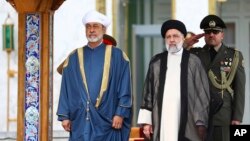Iran on Monday said it has continued indirect negotiations with the United States through the Sultanate of Oman over its nuclear deal and a possible prisoner swap.
Iran's nuclear program has long been the subject of scrutiny from Western powers, resulting in sanctions that have crippled the country's economy.
A 2015 deal granted Tehran much-needed sanctions relief in exchange for curbs on its nuclear program before it was torpedoed by the United States' unilateral pullout in 2018.
In recent days, the two capitals have denied media reports that they were close to reaching an interim deal to replace the 2015 accord.
"We welcome the efforts of Omani officials and we exchanged messages with the other party through this mediator" over the lifting of U.S. sanctions, Iran's foreign ministry spokesman Nasser Kanani said Monday.
"We have never stopped the diplomatic processes," he added during his weekly press conference, emphasizing that the talks "were not secret."
Diplomatic ties between Tehran and Washington soured in 1980 following the 1979 Islamic revolution led by Iran's first supreme leader Ayatollah Ruhollah Khomeini.
Efforts to revive the 2015 nuclear deal have so far failed to yield results.
Iran's supreme leader Ayatollah Ali Khamenei on Sunday reiterated the denial of moves toward acquiring a nuclear weapon.
He also said deals could be reached, provided they do not change "the existing infrastructure of the nuclear industry."
Iran and its adversary the United States have also been involved in Oman-mediated talks over a possible prisoner swap.
Kanani on Monday said a prisoner exchange could be agreed "in the near future," provided that Washington exhibits "the same level of seriousness" as Tehran.
At least three Iranian Americans are being held in Iran, including businessman Siamak Namazi, arrested in October 2015 and sentenced to 10 years in prison for espionage.
In the last few weeks, Iran has released six European citizens and recovered an Iranian diplomat, Assadollah Assadi, who was convicted of terrorism and imprisoned in Belgium.
Kanani also denied that Iran had provided Russia with equipment to "build a drone factory."
White House national security spokesman John Kirby on Friday warned that Russia was receiving materials from Iran to build a drone factory on its territory.
"We deny any accusations regarding the export of arms to Russia for use in the war against Ukraine," Kanani said.




